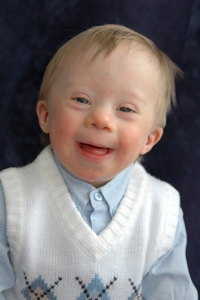In this section
Speech Program

The Masters Family Speech and Hearing Center diagnoses and treats infants, children and adolescents who have feeding or swallowing problems and communication or learning concerns.
Our highly skilled staff includes audiologists and speech-language pathologists who have masters and doctoral degrees.
Will you see my child?
In the speech program, we diagnose and treat speech delays and communication disorders in children. For example, we see children who:
- Are 1 year or younger and are not making or responding to sounds
- Are older than 1 year of age and do not talk at all
- Do not talk as well as they should for their age
- Do not understand what is said to them
- Have an unusual voice
- Have difficulty eating or drinking
Communication disorders take several forms. A child can have a speech disorder, a language disorder, or both. Some children have cognition disorders alone or in addition to communication disorders.
What is the difference between speech, language and cognition disorders in children?
Speech is the production of individual speech sounds and how they combine to form words. Common speech disorders in children can relate to issues with:
- Respiration
- Phonation
- Resonance
- Articulation
Speech diagnoses include:
- Dysarthria
- Cleft lip and palate
- Velopharyngeal incompetency
- Phonologic disorders
- Articulation disorders
- Hypernasality
- Denasality
- Hoarseness
- Breathiness
- Apraxia
- Stuttering
Language is the ability to use and understand words. Language problems include:
- Disorders of understanding what is heard or read
- Disorders of expression or use of gestures or words
Diagnoses include:
- Aphasia
- Developmental language delay
- Language disorder
- Phonological disorder
 Cognition is the ability to process information. Cognition problems affect communication in the areas of:
Cognition is the ability to process information. Cognition problems affect communication in the areas of:
- Attention
- Memory
- Sequencing
- Concentration
- Thought organization
Cognitive disorders in children have a significant impact on language functioning.
What happens at a visit?
Before your first evaluation, we will ask you to complete a case history form and send any previous communication tests or related results to our office. Our children’s speech and hearing specialists will review these forms before your child’s evaluation.
Speech and language evaluation
At the time of the evaluation, a speech-language pathologist will see your child with at least one parent present. We perform this evaluation in a play environment using books, toys and other pictures and objects. We will ask your child to listen and follow directions and to imitate speech sounds or words if possible.
We will also perform an examination of the mouth by either by having your child imitate or by observing him or her as he/she uses the mouth to eat or speak.
We will also perform a hearing test as part of this evaluation. During the hearing test, we will ask your child to listen for sound and to respond by either looking toward a moving object or, if your child is old enough, by placing a block in a container.
Feeding and swallowing evaluation
Before the first evaluation, when addressing feeding problems in children, our clinic will contact you to ask questions about your child's feeding issue. Answers to these questions will help us decide if your child needs:
- A clinical feeding evaluation
- Videofluoroscopic swallow study (x-ray of swallowing)
- Feeding team evaluation
We will ask you forward any previous feeding evaluations or related results to our office before evaluation day. We will review this information, as well as your child's medical record, before the evaluation.
After watching your child eat or drink, the speech-language pathologist will work with you and your child to develop plans to make eating and drinking easier. The speech-language pathologist also may make suggestions about other doctors or specialty clinics that can help with feeding problems in children. We will also provide you with a written plan that includes ideas to try at home. If we recommend therapy, we will schedule a visit with the appropriate therapist.
General evaluation information
For all evaluation types, if we recommend therapy, the speech-language pathologist will work with you to find the best treatment setting based on the needs of your child and your family. If you complete treatment through Children's Wisconsin, we will schedule your child with a speech-language pathologist on our team. If you wish, we can also refer you to a school, other agency, or other hospital.
After the evaluation is complete, we will send the evaluation report to your child's pediatrician. You can also request to have it sent to other doctors, therapists or schools. The report includes a summary of findings, treatment goals and other recommendations.
Whom will my child see?
When your child comes to our office, he or she will see nationally-certified, state-licensed speech-language pathologists and audiologists.
Make an appointment
To make an appointment, call our Central Scheduling team or request an appointment online.
